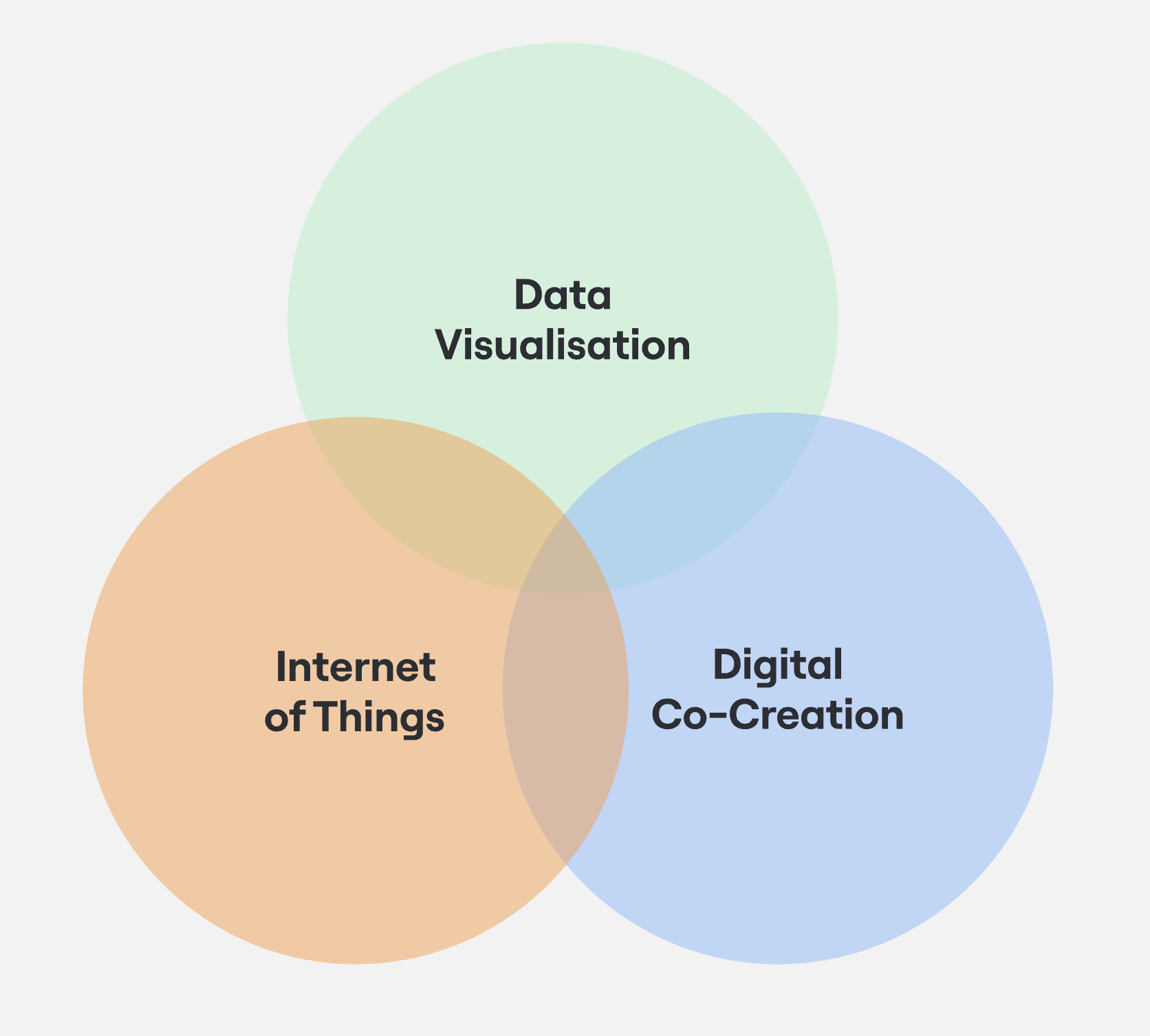Our Vision
 Our built environment can serve as an efficient means of living—culturally, interactively, and ecologically—while our natural environment sustains life through complex ecosystems. Understanding and optimizing these systems is crucial, and digital technologies offer tools for observation and insight.
Our built environment can serve as an efficient means of living—culturally, interactively, and ecologically—while our natural environment sustains life through complex ecosystems. Understanding and optimizing these systems is crucial, and digital technologies offer tools for observation and insight.
Our research on Connected Environments focuses on three core ideas:
Data Visualization: The graphical representation of information and data. By using visual elements like graphs, maps and 3D models, data visualization tools provide an accessible way to see and understand trends, outliers, and patterns in data.
Internet of Things (IoT): Connecting the everyday objects we use, like security cameras and smart speakers, to each other and to us through the internet. This connectivity allows them to work together, automating tasks, simplifying our lives, and helping us save time and energy.
Digital Co-Creation: A collaborative process where multiple stakeholders (users, customers, employees, partners) collectively contribute to the development or improvement of a digital product, service, or experience. This often involves online platforms and tools that facilitate shared ideation, design and feedback.
Research Led Teaching
The UCL Connected Environments research group at The Bartlett Centre for Advanced Spatial Analysis (CASA) explores the cutting edge of ubiquitous computing and its application to understanding and interacting with the built and natural world. Committed to addressing the growing demand for interdisciplinary skills, the group delivers an MSc programme developed in collaboration with industry partners. This programme emphasizes practical skills in programming, data capture, visualization, and stakeholder-driven prototyping, preparing students to analyze and navigate complex systems. Our research and education initiatives collectively strive to push the boundaries of how we sense, process, and understand our environments.
Science of Cities
Our home department, the UCL Centre for Advanced Spatial Analysis, has a long history of thinking about the science of cities and how data can help us understand our complex environment. Our goal for the Connected Environments programme is to extend this activity further and focus on the research challenges that relate to the infrastructure required to instrument our built and natural environments from an end to end perspective – i.e from understanding what to sense, through to developing tools to support decision making. As such it builds on the need for a skill set in programming, data capture and visualisation, and prototyping with stakeholders to support the analysis of complex systems. Examples of this work include the ViLO Virtual London model created to explore how to visualise streaming data such as transport flows and air quality, and the Echo Boxes in the Queen Elizabeth Olympic Park that implement Machine Learning on the devices to intelligently process and classify data at source before sending results to the cloud – an example of “AI at the edge”.
Working with us
This website is the public sketchbook of ongoing research and teaching work at CASA. The UCL Prospectus site contains all the information you would need to find out how to study at UCL and how to apply for the programme, find funding etc. The Bartlett CASA site has further information about the broader activities within The Bartlett and the context in which this programme is run.
We use the blog section of this site to post job opportunities and are always interested in hearing from researchers who are keen to collaborate with us.
PhD Opportunities
We love to hear from potential PhD candidates who are interested in developing research in the area of Connected Environments – the most productive way to reach out to us is to make contact with a one page outline of research project you would like to explore. The proposal is one of the most important pieces of information in the application. We recommend it should be around 1500 words, and it needs to outline your proposed research area. The topic needs to fit with the research interests of our current staff, so that supervision can be ensured. Take care in structuring the proposal, which should contain the following information:
- Title
- Research question
- Why is this question relevant: put it into the context of what has been done.
- Why is this research innovative: justify it through either the topic or the research methods.
- Proposed methodology
- Expected outcomes
- Work timeline.
The UCL prospectus provides further information on how to apply.
The UCL prospectus scholarships page provides information on funding opportunities for postgraduate students.